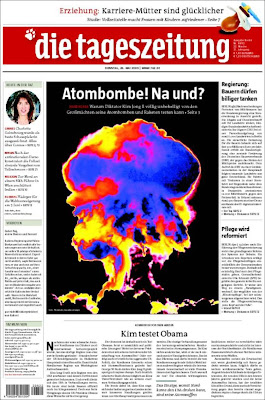

 The South Korean Defense Ministry declined to confirm the report.
The South Korean Defense Ministry declined to confirm the report.After its nuclear test on Monday — its second in less than three years — the North test-fired three short-range missiles, also off its east coast. An intelligence official in Seoul said that move indicated Pyongyang was “getting its back up” about the possibility that United States military aircraft would fly close to North Korea in an attempt to collect radiation data from the nuclear blast.

South Korea’s long-delayed participation in the Proliferation Security Initiative, a program to curb trafficking in weapons of mass destruction, followed a statement on Monday by the United Nations Security Council that unanimously condemned the nuclear test and called it a “clear violation” of a previous resolution.
In Japan, the lower house of Parliament unanimously adopted a resolution Tuesday condemning the North’s nuclear test and threatened to step up sanctions against the communist regime.
“Japan, as the world’s only nation to ever suffer a nuclear attack, cannot condone” North Korea’s repeated nuclear tests, the resolution said. North Korea’s recent belligerence has also prompted Japan’s ruling party to debate whether Tokyo should consider preemptive strikes against states considered hostile — actions that would likely require changes to Japan’s pacifist Constitution.

North Korea appeared unfazed by the world’s condemnation, which included strong rebukes from allies such as China and Russia. In Tuesday’s editions of Rodong, its main party newspaper, Pyongyang declared that it was “fully ready for battle” against the United States, accusing President Obama of “following in the footsteps of the previous Bush administration’s reckless policy of militarily stifling North Korea.”
North Korean officials have said that South Korea’s full membership in the anti-proliferation initiative would be seen as a “declaration of undisguised confrontation and a declaration of a war.” The international effort was begun in 2003 by the Bush administration in order to interdict shipments — especially at sea — of suspected weapons of mass destruction, their related materials and delivery systems.
Russia, Britain, France and Israel are among the 95 signatories to the initiative, which India, Pakistan and China did not sign.

South Korea decided to join the initiative to “counter the grave threat that the proliferation of weapons of mass destruction and missiles poses to global peace and security,” Moon Tae-young, a Foreign Ministry spokesman, said Tuesday in a statement.
North Korea has called such interdictions “terrorism” and sees the initiative, which is largely aimed at its weapons sales, as proof of American bias. North Korean exports of missile parts to countries in the Middle East, particularly Iran, remain a key source of revenue for the impoverished nation.

South Korea had wavered on joining the initiative for fear of provoking the North. But on Tuesday, President Lee Myung-bak, who came to power with a promise to take a tougher approach toward Pyongyang, spoke with Mr. Obama about the North Korean threat and the South’s decision to join the effort.

On the phone, Mr. Lee emphasized to Mr. Obama that the United States and its allies “should not repeat the pattern” of “rewarding” North Korea’s provocations with dialogue and economic aid, as they did after the North’s first nuclear test in October 2006.
Over the years, North Korea has gained confidence through its brinkmanship, Mr. Lee’s aides said, enough that it asked the Security Council to apologize for the sanctions it imposed following the North’s long-range rocket launch in early April.

Mr. Lee’s tougher approach to the North marks a sharp departure from the conciliatory gestures that were prevalent in Seoul during the 10 years of liberal rule under his two predecessors, and the current posture is more closely aligned with Washington and Tokyo.
On Monday, Mr. Lee’s defense minister, Lee Sang-hee, told a parliamentary hearing that a “very effective tool” to stop the North’s nuclear and missile programs would be to “cut off the money.”

The effectiveness of any United Nations sanctions will also depend, in large part, on the willingness of China, the North’s key ally and trading partner, to carry them out.
At the Security Council on Monday, the American ambassador, Susan Rice, said Washington would seek a “strong resolution with strong measures.” Britain, France and Japan were expected to join in the push for new sanctions.

“We are going to pursue a strong resolution with teeth,” Ms. Rice said Tuesday morning in an interview on CNN, though she declined to specify details about the discussions.
Russia and China are likely to remain reluctant to punish North Korea too harshly, although China on Monday said it was “resolutely opposed” to the nuclear test. The Russian ambassador to the United Nations, Vitaly I. Churkin, told reporters that the North’s action was “very serious and needs to have a strong response.”
North Korea has a history of flouting such international condemnation, especially recently: It launched a long-range rocket on April 5 despite international calls for restraint; quit nuclear negotiations; restarted its nuclear plants, and threatened more nuclear and long-range missile tests.

No comments:
Post a Comment